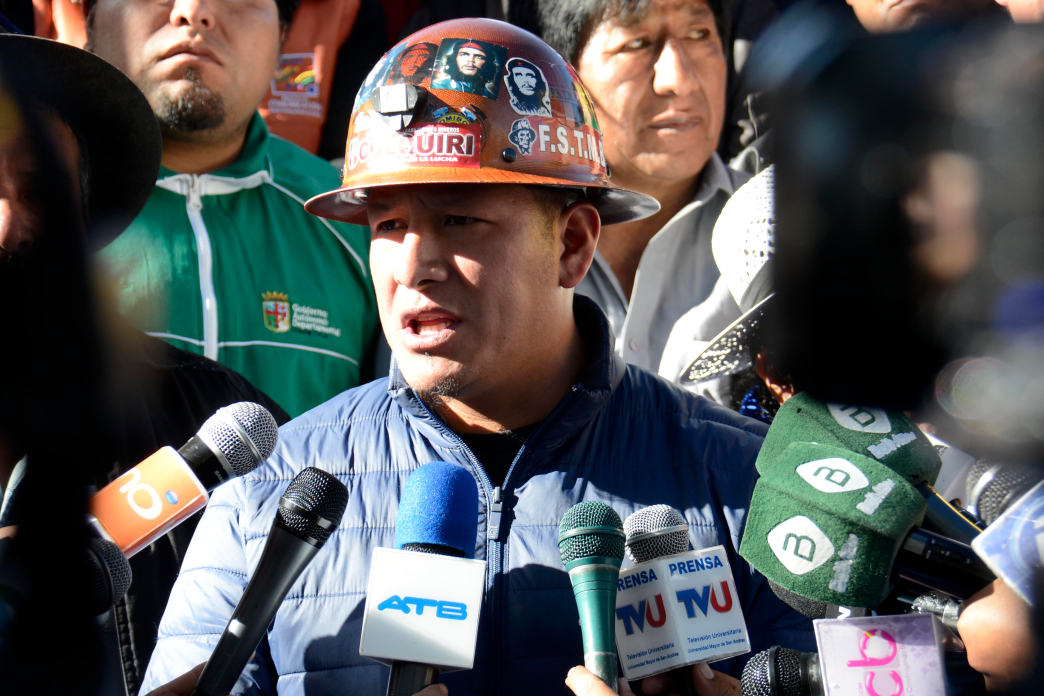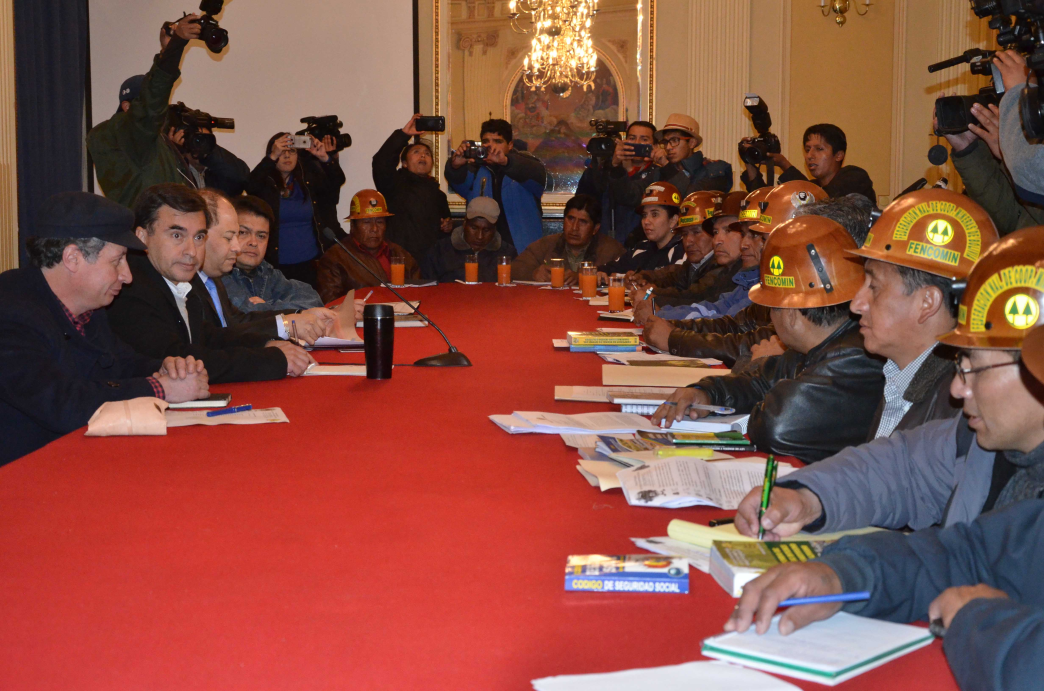
Bolivia Deputy Minister Killing Highlights Dilemma With Mining Cooperatives
Lea este blog en español aquí.
As Bolivian mineworkers opposed the passage of a unionization law and made demands for various financial and regulatory benefits, a series of increasingly violent protests culminated in the unprecedented killing of a high-ranking government official last month.
In August, tensions had escalated between security forces and miners, who blocked roads around several major cities and occupied public offices. Police were dispatched to open roads and defend state property, and violent clashes ensued. Several miners were killed. Deputy Interior Minister Rodolfo Illanes went in person to negotiate with the protest leaders. Illanes was taken hostage and later beaten to death.
These tragic events have underscored Bolivia's mining sector governance challenges.
The Unity Pact, which brings together Bolivia's social organizations, condemned the actions of the cooperative miners and called for justice for the killing of Deputy Interior Minister Rodolfo Illanes. Photo by Gonzalo Jallasi for ABI.
The protesters were from Bolivia’s mining cooperatives. Largely made up of artisanal miners working state or private mineral concessions, cooperatives are major players in Bolivia’s mining sector. In 2014, according to research by the Fundación Jubileo, Bolivia mineral production (mainly zinc, silver, gold, tin, lead and copper) was worth USD 3.6 billion. The state-owned miner, Comibol, produced 9 percent of the total. Corporates were responsible for 47 percent of production; cooperatives contributed 44 percent. Cooperatives have a major role in precious metals mining, producing 95 percent of Bolivia’s gold and 28 percent of its silver. They also have a 26 percent share of zinc production.
However, cooperatives lag behind the corporate sector in the payment of royalties. In 2014, mining royalties totalled USD 162 million, and cooperatives accounted for USD 30.9 million, only 19 percent of the total. Corporate miners generated 74 percent of total royalties.
The cooperatives were established following principles of solidarity, equality and equity in distribution of profits. In theory, cooperatives are managed democratically and have open membership. In many cases, however, cooperative members use their shares of concessions to run small- or medium-scale mining enterprises, hiring salaried employees to carry out the mine work. The number of people employed in the sector fluctuates based on seasonal work and mineral prices, but best estimates are of 110,000 to 130,000 cooperative members and employees. The employees often work under exploitative conditions, earning little, with poor health and safety standards and few protections.
Because of their numbers and strong organization, the cooperatives have been a powerful lobby group on the national stage. Most significantly, several cooperative leaders have been given high-ranking jobs in the government (in the Ministry of Mining and Metallurgy as well as in other entities related to the mining sector). There are currently several cooperative leaders elected to parliament and, until the recent conflict, sitting on the governing board of Comibol. This has helped secure significant benefits from government, most recently in the development of the 2015 mining law. An attempt to defend this favored position in a context of falling prices was one of the drivers of last month’s protest.
An August meeting between government ministers and cooperative leaders in the offices of the vice president. Photo by Carlos Barrios for ABI.
It raises questions about what happens when one mining sector actor is privileged by the government. In many cases, the corporate mining sector might exert undue influence, securing preferential treatment. In this case, the strength of social movements and power of protest in Bolivia has meant that the cooperatives have been able to bend policy in their favor.
The concessions made to cooperatives have spillover effects on the governance of the rest of the mining sector. For many years, cooperatives have operated as artisanal miners in areas ceded to them by the state mining company. More recently, many artisanal and illegal gold miners (those without concessions) have allied with the cooperatives. As the sector has grown, there have been many cases in which cooperatives have occupied private and state concessions by force. This has led to insecurity in concession holding, as enforcement of rights in the face of occupation by cooperatives becomes more problematic. Because of the negotiating power of the cooperatives, Comibol has had to cede areas with mining potential and transfer assets.
In general, cooperatives do not comply with environmental and labor standards. There are several reasons for this: informality, evasion and lack of state capacity to regulate the sector. They have also gained significant tax concessions: they are exempt from VAT and pay a lower royalty rate than corporate miners. They have entered into irregular joint venture contracts and sub-leasing arrangements with corporate miners. According to Interior Minister Carlos Romero, there are 31 unauthorized contracts in areas granted to cooperatives.
Following the killing last month, the government has acted to address several of these issues, imposing greater controls and scrutiny on the cooperative sector, extending greater protections and health coverage to employees and reverting concessions back to the state. However, since the cooperative mining sector is a source of livelihoods for thousands of families, the government can only go so far in limiting the miners’ privileges. An ideal outcome of this recalibration will be decent work for cooperatives employees, greater environmental protection and secure conditions for the state and corporate mining sectors.
Alex Tilley is a development officer with NRGI. Fernando Patzy is a Latin America senior officer with NRGI.
As Bolivian mineworkers opposed the passage of a unionization law and made demands for various financial and regulatory benefits, a series of increasingly violent protests culminated in the unprecedented killing of a high-ranking government official last month.
In August, tensions had escalated between security forces and miners, who blocked roads around several major cities and occupied public offices. Police were dispatched to open roads and defend state property, and violent clashes ensued. Several miners were killed. Deputy Interior Minister Rodolfo Illanes went in person to negotiate with the protest leaders. Illanes was taken hostage and later beaten to death.
These tragic events have underscored Bolivia's mining sector governance challenges.
The Unity Pact, which brings together Bolivia's social organizations, condemned the actions of the cooperative miners and called for justice for the killing of Deputy Interior Minister Rodolfo Illanes. Photo by Gonzalo Jallasi for ABI.
The protesters were from Bolivia’s mining cooperatives. Largely made up of artisanal miners working state or private mineral concessions, cooperatives are major players in Bolivia’s mining sector. In 2014, according to research by the Fundación Jubileo, Bolivia mineral production (mainly zinc, silver, gold, tin, lead and copper) was worth USD 3.6 billion. The state-owned miner, Comibol, produced 9 percent of the total. Corporates were responsible for 47 percent of production; cooperatives contributed 44 percent. Cooperatives have a major role in precious metals mining, producing 95 percent of Bolivia’s gold and 28 percent of its silver. They also have a 26 percent share of zinc production.
However, cooperatives lag behind the corporate sector in the payment of royalties. In 2014, mining royalties totalled USD 162 million, and cooperatives accounted for USD 30.9 million, only 19 percent of the total. Corporate miners generated 74 percent of total royalties.
The cooperatives were established following principles of solidarity, equality and equity in distribution of profits. In theory, cooperatives are managed democratically and have open membership. In many cases, however, cooperative members use their shares of concessions to run small- or medium-scale mining enterprises, hiring salaried employees to carry out the mine work. The number of people employed in the sector fluctuates based on seasonal work and mineral prices, but best estimates are of 110,000 to 130,000 cooperative members and employees. The employees often work under exploitative conditions, earning little, with poor health and safety standards and few protections.
Because of their numbers and strong organization, the cooperatives have been a powerful lobby group on the national stage. Most significantly, several cooperative leaders have been given high-ranking jobs in the government (in the Ministry of Mining and Metallurgy as well as in other entities related to the mining sector). There are currently several cooperative leaders elected to parliament and, until the recent conflict, sitting on the governing board of Comibol. This has helped secure significant benefits from government, most recently in the development of the 2015 mining law. An attempt to defend this favored position in a context of falling prices was one of the drivers of last month’s protest.
An August meeting between government ministers and cooperative leaders in the offices of the vice president. Photo by Carlos Barrios for ABI.
It raises questions about what happens when one mining sector actor is privileged by the government. In many cases, the corporate mining sector might exert undue influence, securing preferential treatment. In this case, the strength of social movements and power of protest in Bolivia has meant that the cooperatives have been able to bend policy in their favor.
The concessions made to cooperatives have spillover effects on the governance of the rest of the mining sector. For many years, cooperatives have operated as artisanal miners in areas ceded to them by the state mining company. More recently, many artisanal and illegal gold miners (those without concessions) have allied with the cooperatives. As the sector has grown, there have been many cases in which cooperatives have occupied private and state concessions by force. This has led to insecurity in concession holding, as enforcement of rights in the face of occupation by cooperatives becomes more problematic. Because of the negotiating power of the cooperatives, Comibol has had to cede areas with mining potential and transfer assets.
In general, cooperatives do not comply with environmental and labor standards. There are several reasons for this: informality, evasion and lack of state capacity to regulate the sector. They have also gained significant tax concessions: they are exempt from VAT and pay a lower royalty rate than corporate miners. They have entered into irregular joint venture contracts and sub-leasing arrangements with corporate miners. According to Interior Minister Carlos Romero, there are 31 unauthorized contracts in areas granted to cooperatives.
Following the killing last month, the government has acted to address several of these issues, imposing greater controls and scrutiny on the cooperative sector, extending greater protections and health coverage to employees and reverting concessions back to the state. However, since the cooperative mining sector is a source of livelihoods for thousands of families, the government can only go so far in limiting the miners’ privileges. An ideal outcome of this recalibration will be decent work for cooperatives employees, greater environmental protection and secure conditions for the state and corporate mining sectors.
Alex Tilley is a development officer with NRGI. Fernando Patzy is a Latin America senior officer with NRGI.
Authors


Fernando Patzy
Andean Manager

